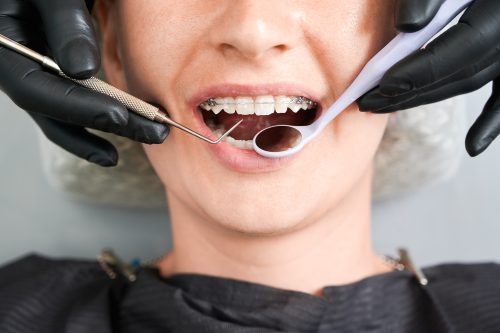Are braces worth it? Straight teeth can boost confidence, improve oral health, and enhance your smile. Braces often come to mind when considering ways to achieve these results. Before deciding on braces, you need to evaluate key factors like cost, treatment duration, and potential benefits. Here’s a detailed look to help you make an informed choice.
Benefits of Braces Beyond Aesthetics

Braces do more than just align teeth. They offer several health-related benefits, making them a worthwhile investment for many.
Improved Oral Health
Misaligned teeth make brushing and flossing difficult. Food debris and bacteria can build up in hard-to-reach areas, increasing the risk of cavities and gum disease. Braces align teeth, making oral hygiene more effective and reducing the likelihood of dental problems.
Better Bite and Jaw Alignment
Uneven bites can cause headaches, jaw pain, and even difficulties in chewing. Braces correct these issues, promoting better function and comfort.
Preventing Long-Term Dental Issues
Teeth that don’t align properly can wear down unevenly, leading to fractures or sensitivity. Braces help prevent these problems by distributing pressure evenly across your teeth.
The Cost of Braces: Is It Worth It?
Braces are a significant financial commitment, but their long-term benefits often justify the cost.
Financial Investment
The cost of braces ranges widely depending on the type and duration of treatment. Traditional metal braces are usually the most affordable, while options like Invisalign or ceramic braces may cost more. Many orthodontists offer payment plans or work with insurance providers to make treatment manageable.
Long-Term Savings
Correcting alignment issues now may prevent costly dental treatments in the future. Straighter teeth and a balanced bite reduce the chances of needing crowns, implants, or other expensive procedures later.
How Long Does Treatment Take?
Treatment time varies based on the severity of your alignment issues and the type of braces you choose.
- Mild Misalignment: Cases with minimal adjustments may take 6 to 12 months.
- Moderate to Severe Issues: Treatment often lasts 18 to 24 months.
- Complex Cases: Some treatments may extend beyond two years.
Regular check-ups and following your orthodontist’s advice can ensure the process stays on track.
Types of Braces to Consider

Different braces suit different needs and lifestyles. Understanding the options can help you make the right choice.
Traditional Metal Braces
These are the most common and effective for complex alignment issues. Metal braces are durable and cost-effective, but they may feel less discreet compared to other options.
Ceramic Braces
Ceramic braces blend with your teeth, making them less noticeable. They work similarly to metal braces but can stain if not cared for properly.
Invisalign or Clear Aligners
Clear aligners offer a removable, nearly invisible alternative to traditional braces. They’re ideal for adults or teens who prefer a discreet option, but they may not suit severe alignment issues.
Lingual Braces
Placed behind the teeth, lingual braces remain hidden while straightening your smile. They work well for people concerned about appearance but may require more frequent adjustments.
What to Expect During Treatment
Braces require a period of adjustment and commitment, but understanding what to expect can make the process easier.
Initial Discomfort
It’s normal to feel pressure or soreness in the first few days after getting braces. Over-the-counter pain relief and soft foods help ease the transition.
Regular Adjustments
Orthodontists adjust braces every 4 to 8 weeks. These visits ensure steady progress and address any concerns you might have during treatment.
Oral Hygiene Routine
Brushing and flossing become more important with braces. Special tools like floss threaders and interdental brushes help clean around brackets and wires effectively.
Food Restrictions
Hard or sticky foods can damage braces. Avoid items like popcorn, chewing gum, and hard candies to keep your treatment on track.
Are There Risks or Downsides?

While braces offer numerous benefits, they come with some considerations you should be aware of.
- Short-Term Discomfort: The pressure from braces can cause temporary soreness, especially after adjustments.
- Hygiene Challenges: Cleaning your teeth takes more effort with braces. Neglecting oral care can lead to staining or gum issues.
- Dietary Limitations: Adjusting to new eating habits may feel restrictive, but it helps protect your braces and teeth.
Being proactive about care and communication with your orthodontist can minimize these challenges.
Is Now the Right Time for Braces?
Timing plays a crucial role in deciding when to start treatment. Many orthodontists recommend braces for children and teens because their teeth and jaw are still developing. Adults can also benefit from braces, though treatment may take slightly longer due to denser bone structures. Modern options cater to a range of ages, so it’s never too late to work toward a healthier smile.
Final Thoughts: Are Braces Worth It?
Braces often provide life-changing benefits that extend far beyond aesthetics. They improve oral health, correct functional issues, and give you a confident smile. While braces require an investment of time and money, the results are usually worth it for those seeking long-term dental and health improvements.
If you’re unsure about braces, consult an orthodontist. Their expertise will help you determine the best treatment for your needs. Taking the first step toward straighter teeth could be one of the most rewarding decisions for your health and confidence.
FAQs About Braces
Can braces cause permanent damage to teeth?
Braces themselves don’t cause permanent damage if maintained properly. However, poor oral hygiene during treatment can lead to staining, cavities, or enamel damage. Always follow your orthodontist’s care instructions.
Are there any alternatives to braces for straightening teeth?
Yes, some people opt for cosmetic solutions like veneers or crowns for minor alignment issues. Orthodontic appliances like retainers or dental expansion devices may also help in certain cases, but their effectiveness depends on the specific condition.
Do braces hurt all the time?
Braces may cause discomfort after adjustments, but this feeling usually subsides within a few days. Persistent pain could indicate an issue that your orthodontist should address.
Can you play sports with braces?
Yes, but using a mouthguard is essential to protect your teeth and braces during contact sports. Orthodontists can recommend custom mouthguards for added comfort.
How do braces affect speech?
Some people experience temporary changes in speech, particularly with appliances like lingual braces or aligners. These issues typically resolve as you adjust to wearing them.
Are braces suitable for adults with severe alignment issues?
Yes, adults can benefit from braces, even for severe alignment problems. Treatment may take longer compared to younger individuals, but advancements in orthodontics have made braces effective at any age.

